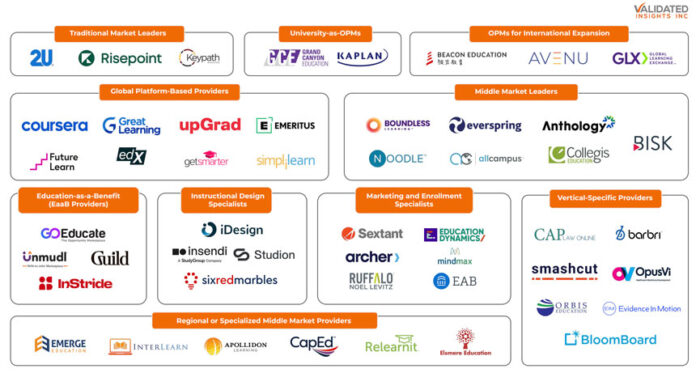IBL News | New York
The OPM (Online Program Manager) industry is at a standstill after colleges’ interest in partnering with these companies vanished, according to data released by market researcher Validated Insights.
Venture Capital investments for OPMs have disappeared, and colleges appear to simply be disenchanted with OPM providers.
The OPM companies work on a revenue-sharing model through which they take a percentage, usually a majority, of tuition and fees for every student they recruit.
In 2023, 147 contracts and partnerships with OPMs expired or were terminated, the most of any year since 2020.
Only eight new OPM contracts were signed in the first quarter 2025 and 21 in the second quarter.
Total funding for OPMs has dropped by 97 percent since peak interest in early 2021, and venture capital investments in the companies have all but disappeared.
Validated Insights’ head of market research, Brady Colby, told Inside Higher Ed, “It used to be that 2U or some other OPM could ink a 15-year agreement at a 70 percent revenue share.” “Those days are over. Institutions now have the upper hand at the negotiating table.”
Ed-tech market analyst Phil Hill said the sector was “on life support.”
Last year, federal regulators put the companies in their crosshairs over their aggressive recruitment practices.
The Education Department is threatening to regulate the OPM space more strictly, primarily by updating guidance for third-party services. For years, OPMs have been able to share revenue with colleges.
This strict regulatory environment has played a role in the sector’s downturn.
In 2024, onetime market leader 2U declared bankruptcy. Fordham University filed to end its long-standing partnership with 2U early last month after seven years of what the institution described as “incompetence” and “negligence.”
In May, Minnesota passed the first state law restricting OPM growth.
This month, a student legal advocacy group sued provider Coursera and its partner, the University of Maryland Global Campus, challenging the legality of the OPM business model.

 En Español
En Español










![OpenAI Released Apps that Work Inside ChatGPT and an SDK [Video]](https://iblnews.org/wp-content/uploads/2025/10/openaieventday-218x150.jpg)










